


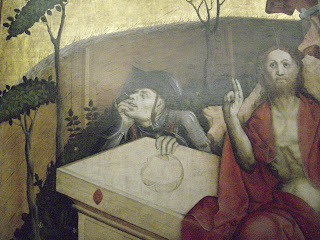
 Hanz Multscher c.1400-before 1467 (The Wings of the Wurzach Altar)
Hanz Multscher c.1400-before 1467 (The Wings of the Wurzach Altar)Der Lauf der Tage. Trying to remember, or to mark where and when. “Sonnenaufgang 7.22; Sonnenuntergant 16.28; Mondaufgang 19.04; Monduntergant, Wasserstand von Havel und Spree…”
Ein Bild. Alle für ein Bild. You feel that it is always—it has always been—the same image.
 Hanz Multscher c.1400-before 1467 (The Wings of the Wurzach Altar)
Hanz Multscher c.1400-before 1467 (The Wings of the Wurzach Altar)
 Westphalian, c.1230/40 (Crucifixion Altarpiece from Soest)
Westphalian, c.1230/40 (Crucifixion Altarpiece from Soest)
“This is no fucking around” you hear once and again in your head, while something like a violin comes and goes too. Perhaps a piano. Now again you’re in front of History. Der Geschichte der Gesichte. Mother and son. Nothing so simple.





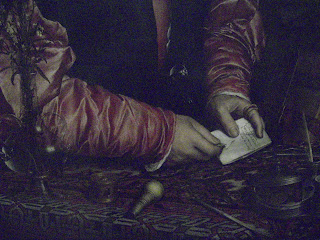 Hans Holbein the Younger 1497-1543 (The Merchant George Gisze)
Hans Holbein the Younger 1497-1543 (The Merchant George Gisze)
But look at the hands. On est jusqu’aux mains. On va jusqu’aux mains. Handelt vorsichtig, die Hände. A prickly subject. Wo sind deine Hände jetzt? “Noli me tangere.” (Your memory of perhaps the first museum that you visited as an artist, with your contemporaries.) (You touch your chin, a hair falls).






It’s only figures here. Cranach, Brueghel, Dürer. But today you weren’t there. That was some days ago. Vor vieren Tage. In der Mitte, Open-Air Party, Postdamerplatz, ein Film, prost prost. Lucrezia, Adam und Eve, die Schwestern. Die selbe? Was für eine Frau?





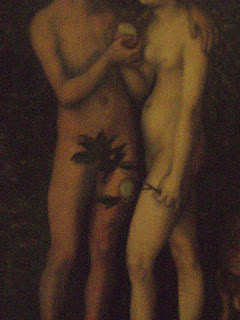

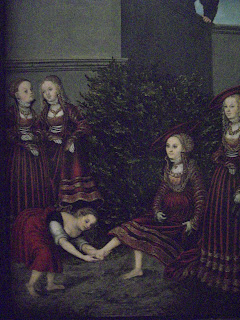 Lucas Cranach the Elder 1472-1553 (David and Bathsheba)
Lucas Cranach the Elder 1472-1553 (David and Bathsheba)You feel you should tell the story again. “Nennt mir die Männer und Frauen und Kinder, die mich suchen werden, mich, ihren Erzähler, Vorsänger und Tonangeber, weil sie mich brauchen, wie sonst nichts auf der Welt.”
You’re in a Museum.
 Westphalian, c. 1400. (The Sacred Countenance of Christ-Vera Icon)
Westphalian, c. 1400. (The Sacred Countenance of Christ-Vera Icon) Bohemian c.1350. (The Crucifixion of Christ)
Bohemian c.1350. (The Crucifixion of Christ)

 Petrus Christ c. 1410-1472/73 (Portrait of a Young Woman)
Petrus Christ c. 1410-1472/73 (Portrait of a Young Woman) Jean Fouquet c. 1420-c.1480 (Étienne Chevalier with St. Stephen)
Jean Fouquet c. 1420-c.1480 (Étienne Chevalier with St. Stephen) 
“I… wanna destroy you”. The rapport of something falling. The relation or story. An uncomfortable body. Name of the sins. Go back to the image. Zwischen Traum und Trauma. Simple homophony. You want to hear the night, you want to imagine the images with a candlelight. Tu es dans le foyer.







Draw(ing). You remember that exhibition. Die Ausstellung der Freunde, deine Freunde. When you draw, you always try to draw bodies. More exactly, your own body—be it feminine or masculine. Denn die Gesichte. Die Gesichte der Gedichte. The reason why you became a poet. Nicht wahr?








Between the mother and the child, a man peeps. “Et pour bien voir il faut le trou de la serrure, le petit pertuis parmi les feuilles, tout ce qui empêche d’être vu et en même temps ne livre de l’objet que des fragments à la fois. Non?” A man peeps towards you—although, he discovers his face.


 Aelbert van Ouwater c. 1415-c. 1475 (The Raising of Lazarus)
Aelbert van Ouwater c. 1415-c. 1475 (The Raising of Lazarus) Jan Gossaert c. 1478-1532 (Mary with the Child)
Jan Gossaert c. 1478-1532 (Mary with the Child)You try not to make this comparison. Not to follow the link. But (the) history is hard, is strong. Seulement essaie d’écouter maintenant ce qui ta voix dit, ce qui est dans ta tête. Questions des enfants—qui ne peuvent pas revenir en arrière—ou en avant. Der Fall. Die Welt ist das, das der Fall ist—lousy (re)translation.
 Jan Gossaert c. 1478-1532 (Neptune and Amphitrite)
Jan Gossaert c. 1478-1532 (Neptune and Amphitrite)  Jan Gossaert c. 1478-1532 (The Fall of Man)
Jan Gossaert c. 1478-1532 (The Fall of Man) Jean Bellegambe c. 1468/70-after 1534. (Triptych with the Last Judgement)
Jean Bellegambe c. 1468/70-after 1534. (Triptych with the Last Judgement) Jean Bellegambe c. 1468/70-after 1534. (Triptych with the Last Judgement)
Jean Bellegambe c. 1468/70-after 1534. (Triptych with the Last Judgement) Jean Bellegambe c. 1468/70-after 1534. (Triptych with the Last Judgement)
Jean Bellegambe c. 1468/70-after 1534. (Triptych with the Last Judgement) Jean Bellegambe c. 1468/70-after 1534. (Triptych with the Last Judgement)
Jean Bellegambe c. 1468/70-after 1534. (Triptych with the Last Judgement) Jean Bellegambe c. 1468/70-after 1534. (Triptych with the Last Judgement)
Jean Bellegambe c. 1468/70-after 1534. (Triptych with the Last Judgement)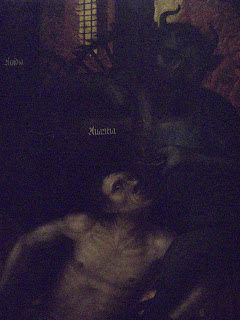 Jean Bellegambe c. 1468/70-after 1534. (Triptych with the Last Judgement)
Jean Bellegambe c. 1468/70-after 1534. (Triptych with the Last Judgement)






Just choose, the body or the gesture—the face. “love me love me love me love me say you do let me fly away with you.” A face, in some way, is historyless. Geschichtelos, in einem Sinn. “with your kiss my life begins”. Weg—verstehst du?
 Quinten Massys 1465/66-1530. (Madonna Enthroned)
Quinten Massys 1465/66-1530. (Madonna Enthroned) Quinten Massys 1465/66-1530. (Madonna Enthroned)
Quinten Massys 1465/66-1530. (Madonna Enthroned) 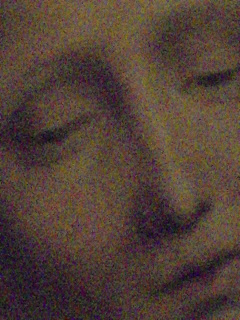






We try with miniatures now. Little scenes. Wait, you’re still at the museum, you have never left it. Postdamerplatzt a museum, your room a museum, this text a museum—yes, full of dead things. Nothing that simple. And this is no drama. “Oh my darling, kling to me”.


 Pieter Bruegel the Elder 1525/30-1569 (Two Chained Monkeys)
Pieter Bruegel the Elder 1525/30-1569 (Two Chained Monkeys)
Pieter Bruegel the Elder 1525/30-1569 (The Dutch Proverbs)

Pieter Bruegel the Elder 1525/30-1569 (The Dutch Proverbs)

Pieter Bruegel the Elder 1525/30-1569 (The Dutch Proverbs)
As you were leaving the Gemäldegalerie, running between the Rubens, trying to capture a few snapshots—as you tried to follow in order not to be left behind—as you were leaving, you started to make sense. A hand close to the body. Dieses Gefühl. Blut in dem Gesicht. You blush a little.






Peter Paul Rubens 1577-1640 (Child with Bird)





Peter Paul Rubens 1577-1640 (St. Sebastian)

Peter Paul Rubens 1577-1640 (Perseus Freeing Andromeda)

Peter Paul Rubens 1577-1640 (St. Cecilia)

“Esau verkauft sein Erstgeburstrechts.” You have written elsewhere about this. Irgendwo hast du über das geschrieben. Ersau found you. Ersau founds you—as he sells his/your right—just as the tomb of Lousse's dog was the tomb of Molloy too. (what you hear now, you bought that album in Paris longtime ago but couldn’t listen to it—First time you hear it in Europa-Tricky).


Rembrandt 1606-1669 (Susanna and the Elders)

 Rembrandt 1606-1669 (Joseph and Potiphar's Wife)
Rembrandt 1606-1669 (Joseph and Potiphar's Wife) Rembrandt, circle of. 1606-1669 (The Man with the Golden Helmet)
Rembrandt, circle of. 1606-1669 (The Man with the Golden Helmet)
Arches, objects—and a window. Vermeer. How did you use to pronounce his name? You saw his images first as a film. (And the other day you talked about Greenaway with an Italian—the same one that invited you to the Open Party close to Postdamerplatz—the party that you saw today, perhaps was still going on.) Eine Frau neben das Fenster, an das Fenster? Sie sieht etwas. Who sees in Vermeer? Niemand. Und noch.

Pieter Jansz Saenredam 1597-1665 (View into the Ambulatory of St. Bavo in Haarlem)

 Nicolaes Maes 1634-1693 (Old Woman Peeling an Apple)
Nicolaes Maes 1634-1693 (Old Woman Peeling an Apple) Jan Vermeer van Delft 1632-1675. (The Glass of Wine)
Jan Vermeer van Delft 1632-1675. (The Glass of Wine) Jan Vermeer van Delft 1632-1675. (Young Woman with a Pearl)
Jan Vermeer van Delft 1632-1675. (Young Woman with a Pearl)
A white story. A big room—and a Count, or a King, or a Duke. Ein Mann. Man muss das vergessen. Kommst aus. Das ist die Nacht. Und hier findest du deinen lieblinge Objet. Ein Auge.
As always, you must go down. Untergeschichte, Untermann. In der Unbekkantheit—in Vergessenheit geraten—U-Bahn.
 Sir Joshua Reynolds 1723-1792. (Lord Robert Clive and his Family with an Indian Servant Girl)
Sir Joshua Reynolds 1723-1792. (Lord Robert Clive and his Family with an Indian Servant Girl) Sir Joshua Reynolds 1723-1792. (Lord Robert Clive and his Family with an Indian Servant Girl)
Sir Joshua Reynolds 1723-1792. (Lord Robert Clive and his Family with an Indian Servant Girl)










Keine Kommentare:
Kommentar veröffentlichen